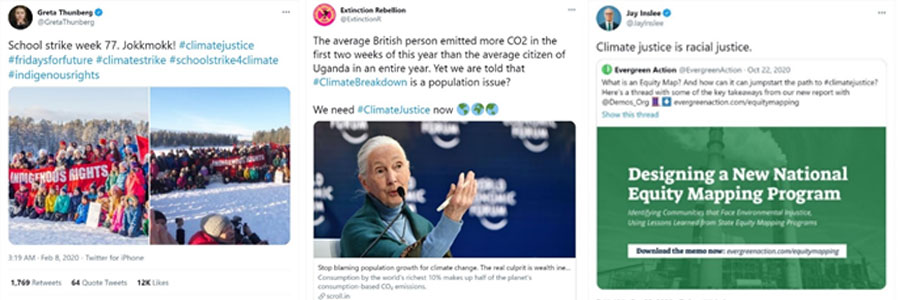New analysis of Twitter conversations reveals the urgent need to put the experiences of marginalised communities and issues of justice at the heart of the climate change agenda.
The Covid-19 pandemic delayed COP26 in 2020 and while the rescheduled climate conference should happen in November, there is still some speculation as to whether the desperately needed commitments from world leaders on climate action will happen.
With so much of the debate on climate action focussed on emissions targets, the challenge for those working in development is how to amplify the voices of marginalised communities facing the most acute impacts of climate change yet who have done the least to create it. This is to ensure their concerns and experiences are put at the heart of climate action. Yet how do we influence the global climate policy agenda to ensure justice for communities living on the front line of climate change?
With more than 3.8 billion people globally using social media to engage, connect and share information, the online conversation provides insight into public awareness of climate issues but also how far social debate is influencing policy decision making. Recent twitter campaigns including #BlackLivesMatter and #MeToo show how global social media conversations can realise change by moving then keeping issues high up on the policy agenda. To understand if this equally applies to climate action and specifically to awareness of climate justice, we completed analysis of 12 months of global twitter conversations using the social listening platform Meltwater.
Across Twitter in 2019 and 2020, the use of the term ‘climate action’ accelerated from 180,000 mentions in 2019, to 533,000 in 2020 – a three-fold increase in just 12 months. But, if climate action is an important and rapidly growing topic of interest, what do these global conversations actually reveal about people’s understanding and priorities for action? How does the focus on technical aspects including carbon emissions compare to engagement with the lived experiences of those worse affected by climate change?
The case for climate justice
In the debate on climate change, there is a tension between how to align the focus on much-needed technical change with the lived reality of the impacts. Our perspective at IDS is that climate change is fundamentally an issue of justice. Its impacts are felt disproportionately by the poorest communities, who often have done the least to contribute to it. In contrast, research shows that between 1990–2015, nearly half of the growth in absolute global emissions was due to the richest 10%, with the wealthiest 5% alone contributing over a third (37%). As governments agree commitments and implement new policies, it is critical that the lives and livelihoods of those already suffering its worst affects aren’t further negatively impacted by responses to it. Their perspectives are fundamental to finding then implementing any solutions that could have a lasting impact.
Focus on emissions over justice
The analysis of global conversations relating to climate illustrates the challenge. We looked at how people talked on Twitter and analysed 12 months of posts during 2020 that contained ‘climate’, ‘justice’, and ‘emissions’. This revealed there were 25 percent more posts related to emissions than those led by climate justice. Over the same period, the topic hashtags #Carbon and #Emissions were used 48 percent more times than #ClimateJustice.
Looking at some of the most retweeted #ClimateJustice posts in 2020 gives some insight into the different messages around ‘climate justice’ that are resonating, as well as who is influential on Twitter.
Top Twitter posts in 2020 using #ClimateJustice include: Greta Thunberg joining a climate strike organised by the Sáminuorra on 07 February 2020, to underline the importance of indigenous knowledge and culture to tackle the climate crisis; an Extinction Rebellion post highlighting the disparity in emissions output of British citizens compared with Uganda; and Jay Inslee, the Governor of Washington, US, resharing a post recognising that climate justice is racial justice.

In terms of audience reach and engagement, the most influential Twitter authors on conversations relating to climate, carbon, emissions and justice are those from global leading large media organisations. This demonstrates that despite the upheaval in the media landscape including the rise of social media influencers, journalists and ‘traditional’ media brands are incredibly important as a source of trusted information and commentary.
@theeconomist 25.6m followers
@reuters 23.4m followers
@leodicaprio 19.6m followers
@wsj 18.8m followers
@time 18.1m followers
#TellCOP26 about #ClimateJustice
Our analysis shows that in the global debate on climate change, there is far less awareness of the importance of climate justice and a lack of understanding of the structural causes of inequalities in how climate change is experienced. The knock-on impact is that this is not prioritised either in public debate, social action or, as a result, by policymakers.
Ahead of COP26, we must act to ensure climate justice – and the experiences of those marginalised globally – are prioritised and meaningful action taken towards climate justice and inequality. Join us in sharing your story or those from communities, charities and other organisations working to address climate justice. We want to hear about why climate justice is important and what change you would like to see in how policymakers approach this issue within the broader debate on climate change. Our hope is that we together can raise awareness and help those most at risk but who have contributed the least to the worst impacts of climate change.
Join us in amplifying messages of climate justice by sharing your stories with the hashtags #TellCOP26 and #ClimateJustice – tag @IDS_UK and we will share your messages.
To kick off the campaign we asked some of our researchers, students and research partners to share their messages with us. Here are the first two:
